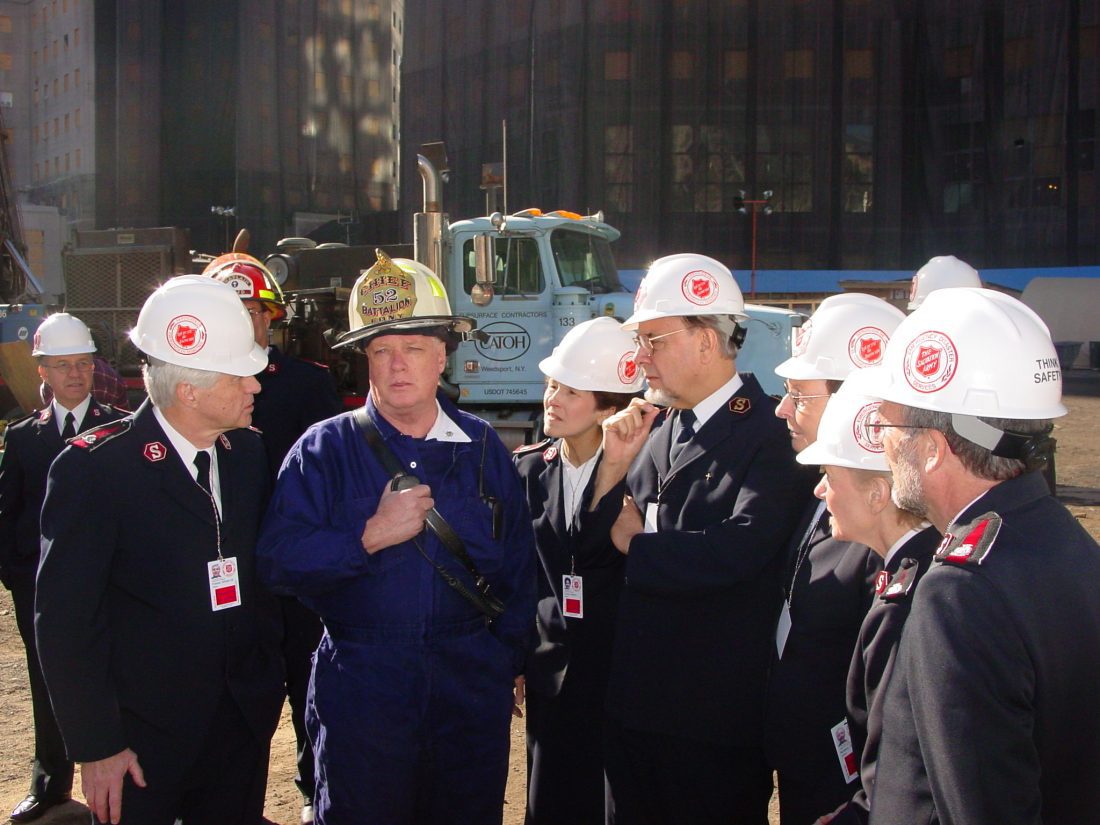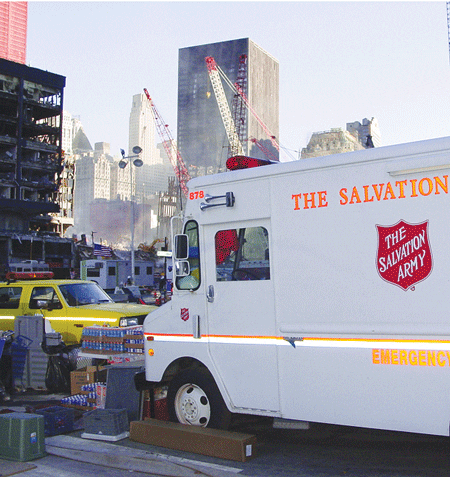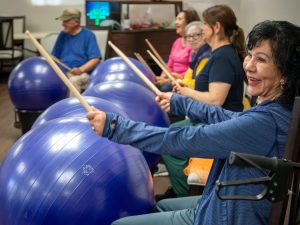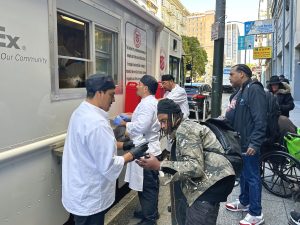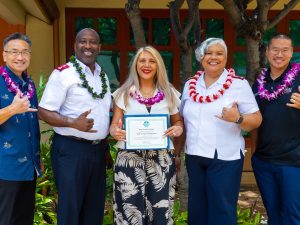“In the end, we simply hugged each other as we fought back emotions that we both knew could become uncontrolled. My new friend and brother—a tall, strong member of the NYPD—turned away in tears.”
WILLIAM W. FRANCIS, COMMISSIONER
While a flood of competing memories enter my mind at the mention of the horrific attack on the morning of Sept. 11, 2001, one memory rises to the top. In the early morning hours of Sept. 12, Commissioner Joe Noland, a small team from Eastern Territorial Headquarters and I drove in procession behind ambulances down the West Side Highway from Rochester, N.Y.. We steadily drove toward the large, black plume of smoke coming from lower Manhattan.
As police waved us through the make-shift checkpoints, we quickly arrived at a Salvation Army canteen that had hurriedly set up shop on the south side of Broadway between Maiden Lane and Dey Street—one block from the rubble of the South Tower.
I remember walking alone down Dey Street. The first person I met was a police officer with whom I had a brief, unforgettable encounter. Our initial greetings were followed by silence, as we stared at each other with disbelief and shook our heads. Words failed. Conversation seemed pointless and nonessential at the time. In the end, we simply hugged each other as we fought back emotions that we both knew could become uncontrolled. My new friend and brother—a tall, strong member of the NYPD—turned away in tears.
At the corner of Dey and Church I came face to face with the smouldering pit already labelled ground zero by the media. The bleak, ghastly scene is forever imbedded in my memory. It remains the most indescribably destructive scene I have ever witnessed. The formidable sturdy girders of the South Tower were twisted and tossed like pretzels, some still awkwardly standing with an implausible bright, stunning blue sky as background.
I crossed what was the street and looked intently into the pit. Simply typing these words brings back vivid sights with surprising details, the putrid smell and the eerie silence interrupted only by firefighters calling to each other and the steady background sound of sirens.
I shall never forget that walk to the pit and the walk back to the Army canteen that had arrived from Pennsylvania only hours before. Commissioner Joe and I gathered the officers and volunteers for prayer. During the prayer, I was overcome with a startling hope and an extraordinary sense of peace—Jesus came alongside of us. We knew that we were not alone. I could almost audibly hear Jesus saying to his early 21st century disciples, I have told you these things, so that in me you may have peace. In this world you will have trouble. But take heart! I have overcome the world (John 16:33).
We stood motionless and in silence, not sure Jesus was finished speaking to us. It was a moment I shall never forget or fully comprehend.
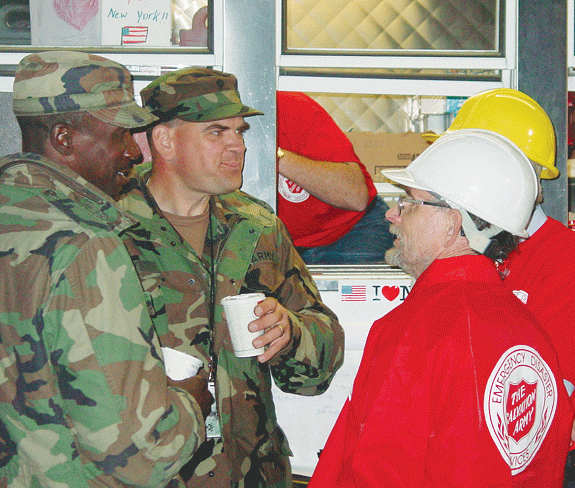
JOE NOLAND, COMMISSIONER
Ten years ago this month, on 9/11, I was sitting in the boardroom at Territorial Headquarters in New York when those two planes flew into the World Trade Center buildings. That tragedy penetrated the barrier of our emotional immunity like none other in recent history. Someone has said, “What the eye cannot see, the heart cannot grieve.” Chaos became the order of the day, especially in our territory. And we began to grieve along with the rest of the nation.
One month later, I took then General John Gowans down into the pit at ground zero. While there, an older gentleman in fireman’s gear approached, put his arms around me in a bear hug and whispered in my ear, “You are the unsung heroes down here!” I said, “No, you are the heroes.” “No comparison,” he responded, and then went on to extol the virtues of The Salvation Army.
Several months later, in December, I happened to be watching “20/20” when this same man appeared in an interview. I sat there flabbergasted as he told the rest of the story. His son was also a fireman and had been up in one of the towers when it came down. This man vowed to stay at ground zero until the remains of his son were found, and they had recently been discovered.
I had no idea! And this man extolled us as the unsung heroes? This was an emotional, humbling and spiritual moment for me, resulting in a reexamination of my own purpose, commitment and motivation, even as the leader of our disaster services deployment in New York City. It also sparked the idea for a film that would capture the essence of our “reason to be” at ground zero—“Unsung”—which has won several prestigious awards and will again be featured during the 9/11 10th Anniversary Weekend on savn.tv (Salvation Army Vision Network).
Each year when this day rolls around, I pause to reexamine my spiritual and emotional immune systems. And then I ask God to penetrate the barriers that have inevitably formed—“What the eye cannot see, the heart cannot grieve.” I am again reminded that in the midst of great tragedy, divine always triumphs.
JAMES KNAGGS, COMMISSIONER
Who would have imagined and who would have thought that the U.S. was about to be attacked? It might have been one of the furthest things from our minds before Sept. 11, 2001. Then it happened. In the Eastern Territorial Headquarters on that fateful Tuesday morning, a messenger interrupted us with news that an airplane had just collided into the World Trade Tower.
We wondered what it meant. Was it a small single engine plane that had mechanical difficulty or directional complications? What damage occurred? Surely those buildings were constructed to take a hit like this.
In less than 25 minutes, we learned that another plane had hit the second tower and that the damage was really bad. Now the news included the fact that they were both commercial flights and that they were likely directed into the towers for maximum impact. It was horrible. As the flames shot up, the worst thing began to happen—the buildings started to collapse and crumble to the ground.
When disaster strikes believers pray. So we did in disbelief of what we had now seen and heard on television. The Salvation Army sprang into action on site. Actually, there was a canteen in place serving the workers 22 minutes after the first plane hit and before the second building was struck. That very unit and its workers had to abandon their spot so as to escape the demise of the towers and reach safety to serve others.
In the ensuing days, many Salvation Army volunteers worked tirelessly to support the relief and rescue workers at ground zero. We can be proud of each one who labored in the name of Christ so selflessly. These towers of civility perished in minutes to the power of terrorists. What once had a permanent place in the skyline of New York City was eliminated in a shorter amount of time than it took to travel the elevator from the top to the bottom floor.
Through this experience we saw the hand of our healing God, who person by person removed the disbelief of a calamitous morning and changed it into belief for a hope-filled tomorrow.
May God bless those families who lost their loved ones 10 years ago and may he inspire those who labored onsite faithfully to the end. Gone, but not forgotten. Taken, but not forever, thanks to God’s love.







